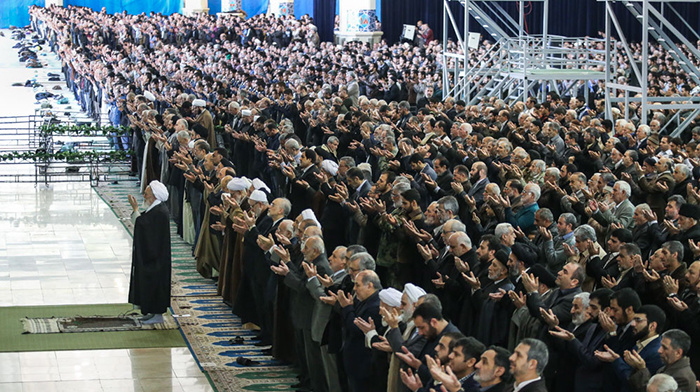Friday Prayers across Iran: Palestine and national reconciliation

(Tehran's Friday prayers. Vali Mohseni/YJC)
One day after the 6th International Conference on Palestinian Intifada, Friday prayers’ leaders across Iran spoke at length in defense of the Palestinian cause. Sermonizers reviewed the history of Palestinian conflict and the roots of the current crisis in the region, and urged Muslim unity against ‘Zionism’ and its Western backers.
“The world should know that Palestine stands atop Iran’s concerns” said Mohammad-Ali Movahhedi Kermani in Tehran. “Our political and national interests are also tied to the Palestinian cause” he added. Tehran’s Friday prayers’ leader called Israel a “fabricated, illegitimate regime”, whose formation was “a satanic plot devised by the British and later assigned to the Americans”. Movahhedi recounted two goals behind formation of Israel: weakening the Muslim World, and exerting control over massive oil and gas reserves of the Middle East. Bringing US Congress bipartisan support for Israel as evidence, he added that the US president was also actually elected by ‘Zionists’, since the POTUS was subservient to the Congress.
In Mashhad, northeast of Iran, Ahmad Alamolhoda also defended hosting of the Intifada conference in Tehran, calling it a necessity to demonstrate the Islamic Republic’s strength amid efforts by Saudi Arabia, Turkey, Israel, and the West during the Munich Security Conference 2017 to show that the Israel-Palestine conflict has come to an end. “The Muslim World should know that the only way to overcome the Zionists is unity among Muslims and emphasis on resistance” said Alireza A’rafi, Friday prayers’ imam in Qom. “The path to victory does not pass through weakness” he told his audience.
The Reformist-backed ‘national reconciliation’ plan, aimed to establish peace between the Reformists and the establishment, also received its share of criticism in this week’s Friday prayers. In Sari, center of Mazandaran Province on the coast of the Caspian Sea, Mohammad Ghasemi questioned the notion of reconciliation, calling it irrelevant since there was no estrangement between the people and the establishment. “What does it mean to call for national reconciliation in the world’s safest country?” Ghasemi asked. “Unless the plan is an excuse to save those under house arrest”, referring to Green Movement leaders Mir Hossein Mousavi and Mehdi Karroubi. In Isfahan, central Iran, Mojtaba Mirdamadi lashed at 2009 ‘seditionists’ who “speak of national reconciliation instead of dying from shame.” Also in Tabriz, northwestern Iran, Mohsen Mojtahed Shabestari, Friday prayers’ leader of the city, questioned calls for national reconciliation, pointing to massive rallies during the anniversary of Islamic Revolution’s victory as a sign of national unity. “If by national reconciliation, they mean making peace with seditionists who desecrated the Ashoura day in 2009, the Iranian nation will never reconcile with those people” he said, reiterating allegations of Green Movement suppoerters tarnishing the sanctity of the most sacred day in Shia culture which marks the martyrdom of Imam Hussain (AS), Prophet Muhammad’s grandson.

